Two best friends, Eitan and Rivka, live in a gated Jewish ghetto, where they have been imprisoned by the Nazis since last Spring. But here they can still experience children laughing, dogs barking and women chatting, all as Eitan plays his violin. Yet no one can leave, and if anyone goes through the gates, they never come back. Light hearted in appearance only, this picture book presents one of the darkest moments in human history, the Holocaust, by showcasing the complexities of the human condition and how hope can endure, be it the music of a violin, or the sound of laughter and chatting. They may be trapped within walls of a ghetto, but they can still climb to the rooftop.
Holocaust
Heroines, Rescuers, Rabbis, Spies: Unsung Women Of The Holocaust
Discover nine ordinary women who took extraordinary measures to save lives during the Holocaust, resisting terror and torture while undercover or in hiding, in concentration camps, in forests, and in exile.
When The World Was Ours
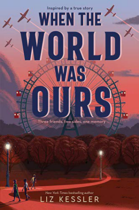
Three young friends—Leo, Elsa, and Max—spend a perfect day together, unaware that around them Europe is descending into a growing darkness and that they will soon be cruelly ripped apart from one another. With their lives taking them across Europe—to Germany, England, Prague, and Poland—will they ever find their way back to one another? Will they want to?
Inspired by a true story, When the World Was Ours is an extraordinary novel that is as powerful as it is heartbreaking and that shows how the bonds of love, family, and friendship allow glimmers of hope to flourish, even in the most hopeless of times.
Journey To America- Escaping the Holocaust to Freedom
In 1938, Lisa Platt and her family know something dangerous is happening in Germany. Lately, there have been more and more restrictions for Jews: yellow stars they have to wear, schools they cannot attend, things they are forbidden to do. When their neighbors are arrested for petty reasons, the Platts realize they have to escape.
Forbidden to bring money or possessions out of the country, Lisa’s father secretly leaves for America, planning to work until he can send for them. But when conditions in Germany worsen, Lisa, her mother, and her sisters flee to Switzerland to wait, surviving on what little they have in a continent hurtling toward war.
This Light Between Us-a novel of World War II
In 1935, ten-year-old Alex Maki of Bainbridge Island, Washington, is horrified to discover that his new pen pal, Charlie Levy of Paris, France, is a girl, but in spite of his initial reluctance, their letters continue over the years and they fight for their friendship even as Charlie endures the Nazi occupation and Alex leaves his family in an internment camp and joins the Army.
Village Of Scoundrels
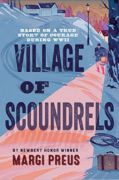
In the 1940s, remote Les Lauzes, France, houses Jews, unregistered foreigners, forgers, and others who take great risks to shelter refugees and smuggle them to safety in Switzerland.
Questions I Am Asked About The Holocaust
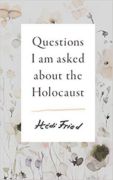
“There are no stupid questions, nor any forbidden ones, but there are some questions that have no answer.” Hédi Fried was nineteen when the Nazis snatched her family from their home in Eastern Europe and transported them to Auschwitz, where she and her sister were forced into hard labor until the end of the war. Now ninety-four, she has spent her life educating young people about the Holocaust and answering their questions about one of the darkest periods in human history. Questions like, “How was it to live in the camps?” “Did you dream at night?” “Why did Hitler hate the Jews?” “Do you see yourself in today’s refugees?” and “Can you forgive?” With sensitivity and complete candor, Fried answers these questions and more in this deeply human book that urges us never to forget and never to repeat.
It Rained Warm Bread
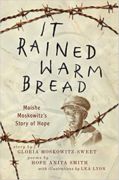
A fictionalized account of the experiences of a Polish Jew, Moishe, who with his parents, brother, and sister, struggles to survive the Nazi invasion and Holocaust.
White Bird
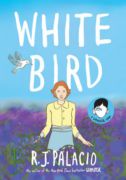
In R. J. Palacio’s bestselling collection of stories Auggie & Me, which expands on characters in Wonder, readers were introduced to Julian’s grandmother, Grandmère. Here, Palacio makes her graphic novel debut with Grandmère’s heartrending story: how she, a young Jewish girl, was hidden by a family in a Nazi-occupied French village during World War II; how the boy she and her classmates once shunned became her savior and best friend. Sara’s harrowing experience movingly demonstrates the power of kindness to change hearts, build bridges, and even save lives. As Grandmère tells Julian, “It always takes courage to be kind, but in those days, such kindness could cost you everything.” With poignant symbolism and gorgeous artwork that brings Sara’s story out of the past and cements it firmly in this moment in history, White Bird is sure to captivate anyone who was moved by the book Wonder or the blockbuster movie adaptation and its message.
The Red Ribbon
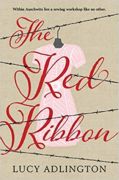
As 14-year-old Ella begins her first day at work she steps into a world of silks, seams, scissors, pins, hems and trimmings. She is a dressmaker, but this is no ordinary sewing workshop. Hers are no ordinary clients. Ella has joined the seamstresses of Birkenau-Auschwitz, as readers may recognise it. Every dress she makes could mean the difference between life and death. And this place is all about survival. Ella seeks refuge from this reality, and from haunting memories, in her work and in the world of fashion and fabrics. She is faced with painful decisions about how far she is prepared to go to survive.
